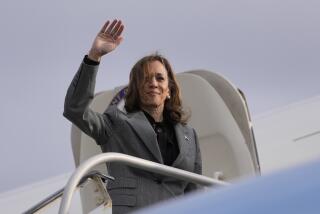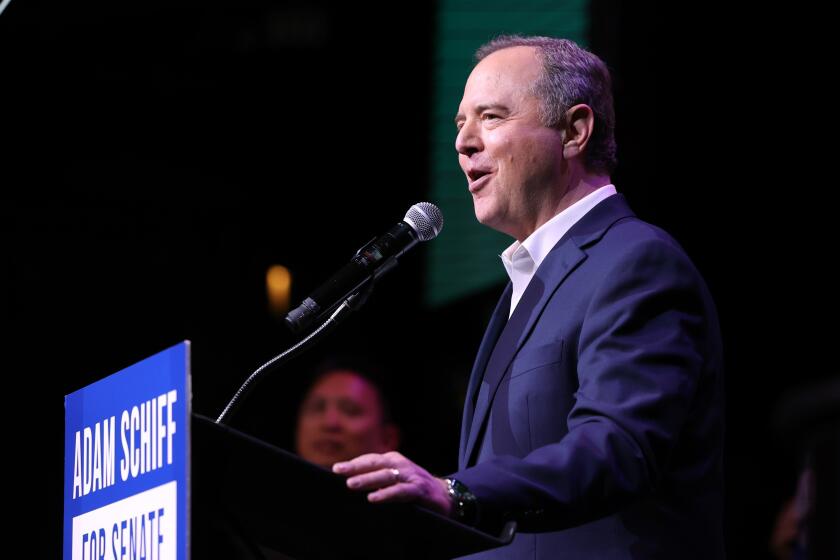Rivals Resume Their Debate, but Part Ways From Now On
President Bush and Sen. John F. Kerry picked up Thursday where their final debate left off, trading barbs over taxes and the “liberal” label as they dashed into the final turn of an election 18 days away.
Both candidates began their days in Nevada, which has just five electoral votes. The visits underscored the careful calibration each side is making as the number of competitive states shrinks and they seek the 270 electoral votes needed to win the White House.
In separate Las Vegas appearances, Bush and Kerry continued the attacks that punctuated Wednesday night’s encounter -- verbal assaults likely to continue up to the Nov. 2 election.
“On issue after issue -- from Medicare without choices to schools with less accountability to higher taxes -- he takes the side of more centralized control and more bureaucracy,” Bush told supporters at a rally in the basketball arena at the University of Nevada. “There’s a word for that attitude: It’s called liberalism.”
Kerry, addressing a nearby convention audience, painted Bush as a patron of the rich and powerful.
The president “gives more to those with the most and tells a struggling middle class that everything’s just fine,” he said. “We need a fresh start, because the truth is, middle-class families can’t afford another four years of the Bush economy.”
With the campaign’s major benchmarks behind them -- conventions, debates, Kerry’s pick of a running mate -- strategists for the two contestants were coming down to crucial decisions: where to deploy their candidate and their resources in these final days.
“Now we get into the real tactics,” said Terry Madonna, director of the Keystone Poll in Pennsylvania, a state that is one of the biggest targets for both men. “It’s positioning yourself in various states to turn out the vote, adjust the buys on TV, adjust the appearances of the candidates.”
Each side was bracing as best they could for the unknown. One taste of the unexpected was the flap over Kerry’s mention of Mary Cheney, the lesbian daughter of Vice President Dick Cheney, in response to a question about homosexuality at the Wednesday debate.
Cheney, his wife, Lynne, and other Republicans strongly objected to Kerry injecting their daughter into the debate, with the vice president calling it “totally inappropriate.” Kerry issued a statement Thursday saying he was simply “trying to say something positive about the way strong families deal with this issue.”
Meanwhile, strategists in both camps were narrowing their attention to a small number of states, agreeing that the most competitive ones were Florida, Ohio, Wisconsin, Iowa and New Mexico, with a total of 69 electoral votes. Others also thought to be in play, to a lesser extent, are Pennsylvania, Michigan, New Hampshire, Nevada, Colorado and Minnesota, with a total of 66 electoral votes.
Each campaign has mapped out a rigorous travel schedule for its candidate over the next 2 1/2 weeks, with Kerry planning three to four events a day and Bush expected to return to the White House just a handful of times between now and the election.
And both sides and their allies were gearing up massive get-out-the-vote efforts in the battleground states, with the Bush campaign planning a dry run Saturday involving thousands of volunteers around the country, said Ken Mehlman, manager of the president’s reelection effort.
With national polls showing Bush and Kerry running close to even, the two sides agree that turnout -- more than TV commercials or anything the candidates say -- will likely determine the outcome on Nov 2.
“It comes down to mechanics, lawyers and a little bit of luck,” said one fretful GOP strategist, referring to the legal skirmishing that has already begun in some states over voting rules and access. “It’s really about who brings their folks to the polls.”
Bush’s strategy appears aimed at mobilizing core Republicans, reflecting a belief that millions of party loyalists stayed home in 2000, costing the president the popular vote against Democrat Al Gore.
Mehlman said Bush would continue to make Kerry the focus of his campaign, portraying him as a spendthrift liberal and questioning his fitness to serve as a wartime commander in chief.
“I think the burden of proof is on the challenger,” Mehlman said, disputing the notion that reelection contests traditionally are referendums on the incumbents. “The debates have raised more questions than they’ve answered.”
But polls indicate Kerry was the winner of all three of the debates, and his strategists believe the senator passed an important credibility threshold.
“People saw him onstage and saw he wasn’t the caricature the Bush campaign had advertised and the president had talked about,” said Steve Elmendorf, Kerry’s deputy campaign chief. “He’s seen as a potential president.”
Events permitting, the senator now hopes to move past a discussion of Iraq, an issue that has dogged him throughout the campaign, to focus on domestic issues, which Democrats consider more promising terrain.
To that end, Kerry plans to give a series of policy speeches in coming days, said Tad Devine, a senior campaign advisor who described substance “as the most powerful way to connect” with undecided voters and those still open to persuasion.
Reminded that Kerry fell behind the last time he promised a more high-road approach -- and ignored attacks from groups such as the anti-Kerry Swift Boat veterans -- Devine said there would be no repeat. “We will not allow attacks to go unanswered,” he said.
Indeed, Kerry took the offense in Thursday’s appearance before more than 10,000 seniors at the AARP convention, calling Bush’s plan for partially privatizing Social Security a “rip-off” that would slash benefits while enriching Wall Street.
“You know who makes out in this program?” Kerry asked. “Big brokerage houses in New York and elsewhere that manage private Social Security accounts. They’d make $940 billion in windfall profits -- $940 billion for the powerful and well-connected, lower benefits and a higher tax bill for you. If George Bush doesn’t get what’s wrong with that, he’ll never get it.”
Kerry also renewed his criticism of Bush’s tax cuts, saying they had shifted the income-tax burden from the wealthy onto the middle class.
“That’s the great difference between George Bush and me,” Kerry said. “Both of us are at the top. He believes that you ought to fight to protect the people at the top. I believe I didn’t need that tax cut, but there are a lot of folks in the middle of America who did, and we deserve a president who fights for them.”
In addition, Kerry criticized Bush’s Medicare reforms for not allowing bulk purchases of prescription drugs by the government or imports of relatively inexpensive drugs from Canada.
Bush sent his wife, Laura, to address the group, which lobbies for people 50 and over.
The president, at his nearby appearance in Las Vegas, joked that convention organizers had asked for “your best speaker.”
Appearing to a thunderous ovation inside the UNLV basketball arena, Bush rolled up his sleeves as he tore into Kerry. He described his opponent as an old-school liberal who would raise taxes, boost government spending, ignore the problems facing Social Security and cede control of U.S. foreign policy to countries abroad.
“My record is one of lowering taxes,” Bush said, “reforming education, providing prescription drugs to seniors, improving our homeland protections and waging aggressive war against the terrorists. The senator’s record is 20 years of out-of-the-mainstream votes, without many significant reforms or results.”
He accused Kerry of ducking those differences throughout their debates. “I’m proud of my record,” Bush said. “My opponent seemed to want to avoid talking about his.
“There is a mainstream in American politics, and my opponent sits on the left bank,” he said, drawing cheers as he repeated a one-liner from Wednesday night’s debate. At an evening rally in Central Point, Ore., Bush applied a regional touch to his relentless characterization of Kerry as a rudderless politician, telling an appreciative audience: “I guess it’s not only the wildfires that shift in the wind.”
*
Finnegan reported from Las Vegas and Barabak from Phoenix. Times staff writer Edwin Chen contributed to this report.
More to Read
Get the L.A. Times Politics newsletter
Deeply reported insights into legislation, politics and policy from Sacramento, Washington and beyond. In your inbox three times per week.
You may occasionally receive promotional content from the Los Angeles Times.












